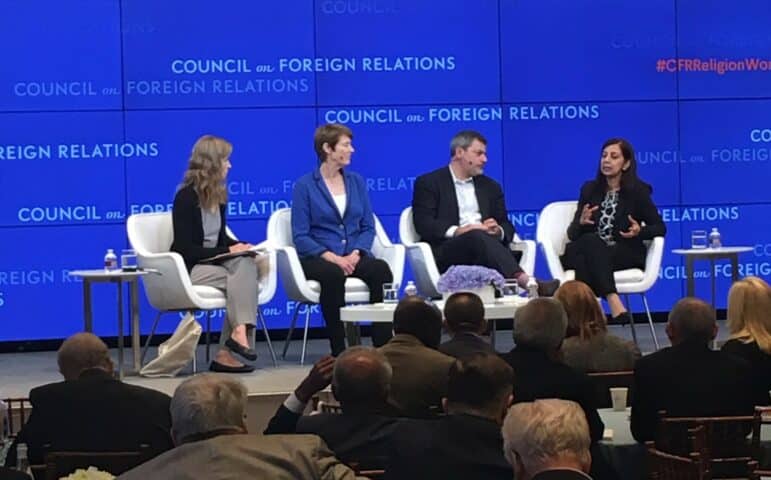
Council on Foreign Relations: CEE’s Karenna Gore presides over Combating Climate Change conversation
CEE Director, Karenna Gore presided over the conversation Combating Climate Change, Wednesday, June 26, 2019 at the Religion and Foreign Policy Workshop for the Council on Foreign Relations.
Distinguished Panel:
Jason Bordoff, Founding Director, Center on Global Energy Policy, Columbia University School of International and Public Affairs; Former Special Assistant to the President and Senior Director for Energy and Climate Change, National Security Council
Brenda Ekwurzel, Senior Climate Scientist and Director of Climate Science, Union of Concerned Scientists
Kanta Kumari Rigaud, Lead Environmental Specialist and Regional Climate Change Coordinator in the Africa Region, World Bank Group
***
Karenna opened the panel with this introduction:
“This is an important discussion to have in this place and time with exactly this group of people. The impacts of climate change are already here—stronger storms, record downpours and floods, deeper droughts, more destructive wildfires, melting ice and rising sea levels, loss of whole species of life in the sixth great extinction, and an increasing amount of strain and suffering among the most vulnerable peoples of the world. Week after week we see both scientific analysis and snapshots of experience. The news media is starting to connect the dots a bit more. This week, there are record high temperatures in Miami and Europe. This Friday, on the same day that our women’s soccer team is playing France in France, the temperature is expected to reach 113 degrees Fahrenheit in the southern part of that country.
The causes are also quite present among us. And if we can see them clearly, and confront and change them, we might be able to stop this tragedy from getting unimaginably worse. In addition to that, we must simultaneously work to adapt to the damage that has already been done to our ecological system, including those worsening impacts that will come no matter what we do now. And we must work to protect as many people from harm as we can.
The climate crisis is not merely an environmental crisis. It is an economic crisis. Yesterday’s New York Times included a report that Florida may have to build $76 billion worth of sea walls by 2040, perhaps causing some new thinking in that hotbed political state.
The U.N. Special Rapporteur on Extreme Poverty and Human Rights Philip Alston issued a report this week saying, “Climate change threatens to undo the last fifty years of progress in development, global health, and poverty reduction. It could push more than 120 million more people into poverty by 2030 and will have the most severe impact in poor countries, regions, and the places poor people live and work.”
It is a political crisis. We are already seeing the effect of the new government’s policies in Brazil in the Amazon rainforest and, of course, in this country as well. The outlines of the future of public discourse on this topic are already taking shape due to the demands and actions of a younger generation that is living the consequences. As the Swedish teenage activist Greta Thunberg has said, “Since our leaders are behaving like children, we will have to take the responsibility they should have taken long ago.”
It is a national security issue, as the United States military and intelligence communities have recognized and stated for decades. It is also a moral issue. It requires deep consideration of our moral obligations to one another across time and space. It asks us to consider our interconnections to nonhuman life, and whether we will value and protect it. It requires us to separate truth and delusion, and to have the courage to face down powerful interests as well as our own misguided habits and patterns. And for many, many people, it presents the question of the role of God or the divine, in whatever form or forms it takes, in the world.
Does God independently intervene in the course of events? Is God expressed within the laws of nature, in the chemistry, physics, and metaphysics of our world, in the very essence of the relationship between cause and effect, leaving us with free will to discern our fate? What is sacred? What is evil? The expertise of the world’s faith and wisdom traditions are seriously needed for this challenge.”
Combating Climate Change – complete video and transcript.
